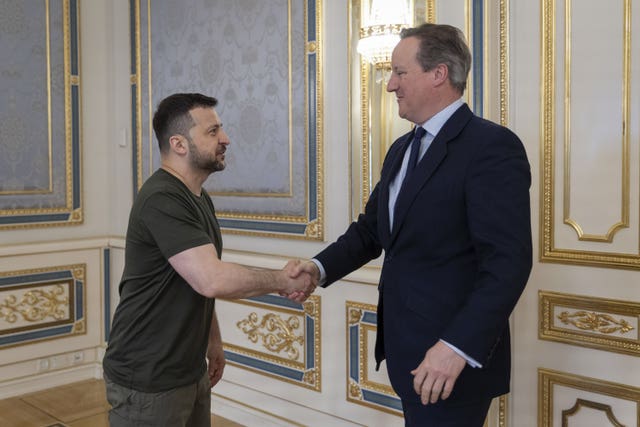
Tonight with Andrew Marr 6pm - 7pm
6 May 2024, 19:34

Moscow warned that Ukrainian strikes on Russian territory with UK-supplied weapons could bring retaliatory strikes.
Russia has threatened to strike British military facilities and said it will hold drills simulating the use of battlefield nuclear weapons amid rising tensions over comments by senior western officials about possibly deeper involvement in the war in Ukraine.
After summoning the British ambassador to the Foreign Ministry, Moscow warned that Ukrainian strikes on Russian territory with UK-supplied weapons could bring retaliatory strikes against British military facilities and equipment on Ukrainian soil or elsewhere.
The remarks came on the eve of Russian President Vladimir Putin’s inauguration to a fifth term in office and in a week when Moscow on Thursday will celebrate Victory Day, its most important secular holiday, marking its defeat of Nazi Germany in the Second World War.
The drills are a response to “provocative statements and threats of certain western officials regarding the Russian Federation”, the Defence Ministry said in a statement.
It is the first time Russia has publicly announced drills involving tactical nuclear weapons, although its strategic nuclear forces regularly hold exercises.
Tactical nuclear weapons include air bombs, warheads for short-range missiles and artillery munitions and are meant for use on a battlefield. They are less powerful than the strategic weapons — massive warheads that arm intercontinental ballistic missiles and are intended to obliterate entire cities.
UN spokesman Stephane Dujarric expressed concern that various parties have been talking about issues regarding nuclear weapons recently.
“Current nuclear risks are at an alarmingly high level,” he said. “All actions that could lead to miscalculation, escalation with catastrophic consequences, must be avoided.”
The Russian announcement was a warning to Ukraine’s western allies about becoming more deeply engaged in the two-year-old war, where the Kremlin’s forces have gained an upper hand amid Ukraine’s shortage of manpower and weapons.
Some of Ukraine’s western partners have previously expressed concern that the conflict could spill beyond Ukraine into a war between Nato and Russia.
French President Emmanuel Macron repeated last week that he does not exclude sending troops to Ukraine, and UK Foreign Secretary Lord David Cameron said Kyiv’s forces will be able to use British long-range weapons to strike targets inside Russia.
Some other Nato countries providing weapons to Kyiv have baulked at that possibility.

The Kremlin branded those comments as dangerous, heightening tension between Russia and Nato. The war already has placed significant strain on relations between Moscow and the West.
Kremlin spokesman Dmitry Peskov said on Monday that Mr Macron’s recent statement and other remarks by British and US officials had prompted the nuclear drills.
“It’s a new round of escalation,” he said, referring to what the Kremlin regarded as provocative statements. “It’s unprecedented and requires special attention and special measures.”
Russia’s Foreign Ministry summoned the French and British ambassadors, and urged the British ambassador “to think about the inevitable catastrophic consequences of such hostile steps from London”.
Sweden’s foreign minister Tobias Billstrom said the nuclear exercises “contribute to increasing instability”.
“In the current security situation, Russia’s actions may be considered particularly irresponsible and reckless,” he told Swedish news agency TT.
Dmitry Medvedev, the deputy head of Russia’s Security Council which is chaired by Mr Putin, said the comments by Mr Macron and Lord Cameron risked pushing the nuclear-armed world towards a “global catastrophe”.
In March 2023, after the UK’s decision to provide Ukraine with armour-piercing shells containing depleted uranium, Mr Putin said he intended to deploy tactical nuclear weapons on the territory of Ukraine’s neighbour Belarus.
The ministry said the latest exercise is intended to “increase the readiness of non-strategic nuclear forces to fulfil combat tasks” and will be held on Mr Putin’s orders. The manoeuvres will involve missile units of the Southern Military District along with the air force and the navy, it added.
The Russian announcement stirred little reaction in Ukraine, where the spokesman for the Military Intelligence agency, Andrii Yusov, said on national television: “Nuclear blackmail is a usual practice of Putin’s regime; it does not constitute major news.”
Western officials have blamed Russia for threatening a wider war through provocative acts. Nato countries said last week they were deeply concerned by a campaign of hybrid activities on the military alliance’s soil, accusing Moscow of being behind them and saying they represent a security threat.
Mr Peskov dismissed those claims as “new, unfounded accusations levelled at our country”.
Germany said on Monday it had recalled its ambassador to Russia for a week of consultations in Berlin after an alleged computer hack of Chancellor Olaf Scholz’s party.
Meanwhile, Ukrainian drones hit two vehicles on Monday in Russia’s Belgorod region, killing six people and injuring 35 others, including two children, local authorities said. The area has been hit by Kyiv’s forces in recent months.
One of the vehicles was a minibus carrying farm workers, Belgorod governor Vyacheslav Gladkov said.